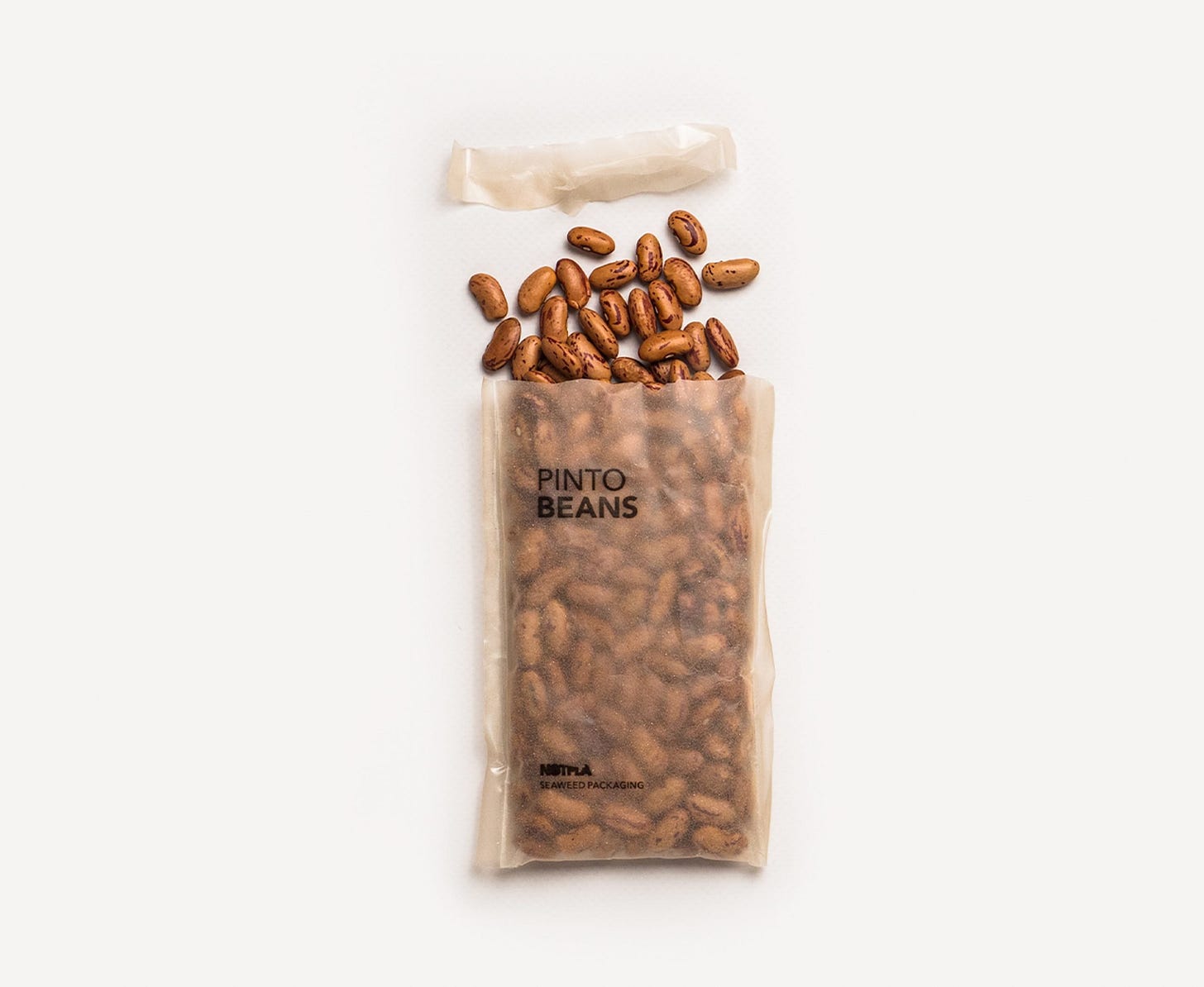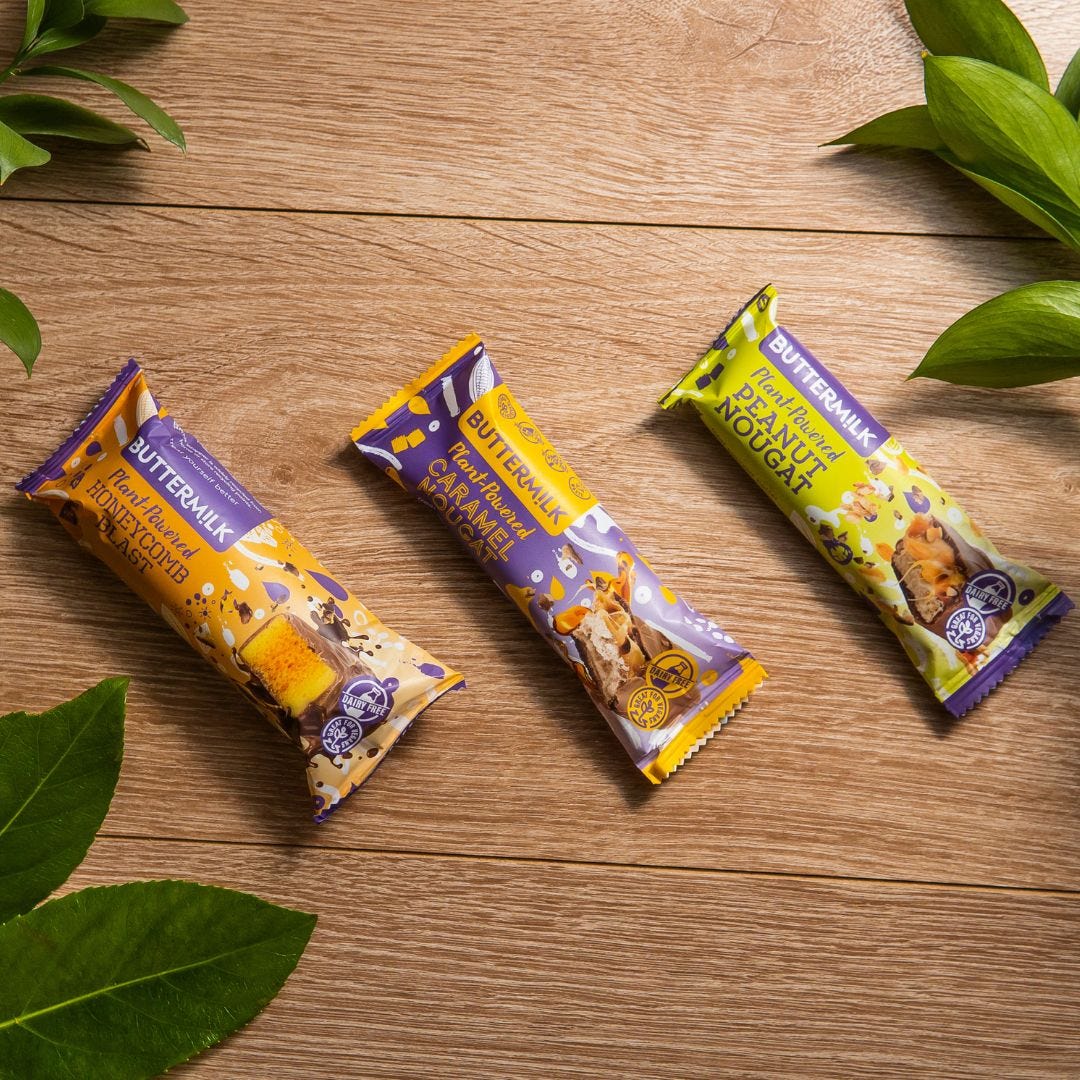🌱 Plastic Free July: Could seaweed, and Notpla, be a solution to plastic pollution?
Featuring Buttermilk Chocolate, Radiant Matter, Reusabox and more...
Happy Monday!
This week is the first week of Plastic Free July. So, we’re covering:
Quick Take: Plastic Free July: Could seaweed, and Notpla, be a solution to plastic pollution?
Brand Spotlight: Treat Trailblazers: How Buttermilk Chocolate are delivering on their Zero Waste Promise.
In case you missed it: 🌱 Producer Responsibility Obligations (PRO): What does your brand need to do?
> Good News Last Week
🎯 Radiant Matter announced it is developing the world’s first BioSequin™ which is made from cellulose – a material that is both plant-based and abundant. They are revolutionising the approach to a sustainable embellishment components.
🎯 Flawsome! Drinks launched their Wonky Fruit Water drink, with paper straw and paper wrapper, to reduce plastic waste. This is the first paper wrapper in the kids’ drinks category.
🎯 Reusabox, a company that helps cardboards in use for longer, announced they are B Corp certified, with a score of 90.7.
⭐️ Marks and Spencer launched a dairy-free milk alternative in a similar cartons to those of cow’s milk - due to customers asking for vegan milk in larger size. The product is now available nationwide in the UK.
⭐️ John Lewis Partnership announced that their net-zero science-based targets are validated by the Science Based Targets initiative, making them the first UK retailer to have their targets validated.
⚡ Dealroom.co and FoodLabs released the Foodtech Report 2023, highlighting technology and innovation in solutions to the environmental footprint of our food system. Solutions offered are ranging from mycelium precision fermentation to cell culture, all to achieve less food production impacts.
⚡ UNEP and UN Climate Change co-published The Sustainable Fashion Communication Playbook, providing a shared vision and guidance on how to align consumer-facing communication in the global fashion industry with sustainability targets.
> Click on each link to read more.
> Quick Take
Plastic Free July: Could seaweed, and Notpla, be an answer to plastic pollution?
Welcome to July, aka ‘Plastic Free July’. Plastic Free July is a global movement that helps millions of people be part of the solution to plastic pollution. To support this, we will be looking at some of the issues with plastic and solutions on offer from companies such as Notpla.
Whether you have watched David Attenborough’s Blue Planet or not, we are all aware of the devastating effect plastic pollution has on our environment. It is something we can witness in our everyday lives, from litter on roadsides to frustrations with, what feels like, unnecessary single use plastic packaging on products.
Let’s take a look at some of the facts…
1 million marine animals are killed by plastic pollution every year.
Plastic ingestion by people could be equating to a credit card a week.
However, despite all these stats, plastic itself is not inherently bad. For example, it can help keep medical equipment hygienic and can provide a lower carbon footprint than other alternative packaging solutions. Yet, despite the benefits, it is the way that our current systems manage/mis-manage plastics and how it has been converted into a single use and disposable commodity which have transformed plastic into a planetary disaster. The way we use and dispose of plastics must change for the sake of not just the environment – but also our economy.
Bring in Notpla (short for ‘not plastic’)…
Founded in 2019, winners of the prestigious 2022 Earthshot prize (‘build a waste-free world’ category) and recently certified as a B Corp, they are on a mission to make packaging disappear. They have a portfolio of packaging solutions made from seaweed and plants that are naturally biodegradable and home-compostable, just like a piece of fruit. Each product is tailored to specific industries from electronics to fashion and food.
Examples of Notpla’s products include:
Notpla Coating - a grease and water resistant coating which can be used to make food containers fully biodegradable.
Notpla Ooho - an edible bubble which can be used to replace single use plastic packaging for liquids. For example, it was used for the London Marathon in 2019 to replace plastic bottles and can be used as a sauce sachet.
Notpla Film - a flexible film packaging which can replace conventional flexible plastic packaging and promises to break down naturally without releasing any micro plastics.
Seaweed is the star ingredient for Notpla. Unlike fossil-based plastics or bioplastic, using seaweed enables Notpla to create circular and sustainable materials. For the Ooho product you can simply eat it or for other products you can compost them. The products are easily biodegradable in nature without specific conditions and take 4-6 weeks to completely disappear (don’t just take it from us, read more here). Not only does it provide a circular solution to single use packaging, seaweed is also one of nature’s most renewable resources. It grows rapidly without needing water or fertiliser. For example, Kelp can grow up to 1 meter a day. Building on this it simultaneously sequesters carbon and de-acidifies the ocean. Sounds like a true climate hero, if you ask us!
According to their 2022 Impact Report, in 2022 Notpla avoided the use of 4.4 tonnes of plastic through the use of their products. Not stopping there, they forecasts to avoid a huge 27.6 tonnes in 2023 - big numbers and an even bigger impact! We can’t wait to follow Notpla’s momentum and see how their innovation continues to drive change.

> Brand Spotlight
Treat Trailblazers: How Buttermilk Chocolate are delivering on their Zero Waste Promise.
We love chocolate, and we love brands that are pioneering for the future. So naturally, when we come across brands that combine both chocolate and sustainability, it’s a no-brainer that we want to shout about them from the rooftops. Our previous brand spotlights on Tony’s Chocolonely, Bantu Chocolate and UP-UP Chocolate are proof of this (warning: you’ll get hungry).
This Plastic Free July, we’re excited to highlight Buttermilk – a Cornish Confectionary company committed to proving that sweet treats should be really good, across the entire triple bottom line - people, planet and profit. Buttermilk was created in a traditional fudge shop in Padstow, Cornwall, in 1964. Since its creation, the brand has undergone many changes to make it what it is today – an award-winning plant based chocolate company. FTF team member Emma first found the brand whilst searching for a Crunchie alternative, and she can confirm that the Honeycomb Blast bar has been a game changer.
Here’s what your brand can learn from these ‘Treat Trailblazers’ this July:
1. Economic Sustainability: A good quality product is essential.
By focusing on a core range and treat style – in this case plant-based and free-from – the team have perfected the products, appealing to a wide audience. The Caramel Nougat Bar was awarded a double gold for new product & innovation in the Free From (2022) and the Grocer (2021) awards, whilst the Peanut Nougat bar took home the gold in the 2023 Free From Awards. The Buttermilk collection is now a staple product across the country and abroad – rivalling dairy competitors in every aspect. You can see all the stockists here.
2. Environmental Sustainability: Make a sustainability commitment that becomes a non-negotiable for your brand.
Zero waste is a fundamental part of Buttermilk’s purpose, and it is clear they mean business. From the production line and kitchen powered by their biomass boiler and solar panels, to the removal of single-use plastic packaging across the entire range, to the 77% reduction in the volume of packaging in the Salted Caramel Cups bag. Zero waste isn’t an afterthought with Buttermilk, in fact, this commitment receives as much spotlight and innovation as the product development itself. They ‘promise to only use packaging that's designed to be recyclable, containing recycled materials or is reusable’ - that’s something we can get behind.
3. Social Sustainability: Where and how you buy ingredients matters.
Buttermilk has succeeded in creating an award winning, dairy-free, gluten-free, and zero waste product range. They could have called it a day there and we’d have been impressed. But true to their mission, Buttermilk wanted us to have really good treats. So they use 100% EU sugarcane and procure their cocoa from a farmers union, as well as support their local Cornish community through their partnership with Field to Forest – planting trees on farmland unusable for growing food.
Buttermilk are an example of true business sustainability across the triple bottom line. If you want to support their mission or know more, check out their website here (take it from us the taster box is a DREAM).
Take a closer look at Buttermilk:

> In case you missed it
🌱 Producer Responsibility Obligations (PRO): What does your brand need to do?
Featuring Kib Herbal Tea, Peregrine, Montaine, Little Freddie and more...
> Follow up with…
Article: Net-Zero journey, explained
Article: What Plastic Pollution? These Companies Are Making Packaging Disappear
Podcast: Startup Series: ByFusion
Event: Bread & Jam July Social: Earth Overshoot Day - 13th July


